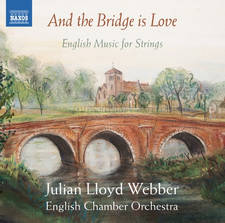The Full Works Concert - Thursday 29 August 2013: John Rutter
For the penultimate Great Composer Full Works Concert, Anne-Marie Minhall explores the music of the only living composer among her choices - John Rutter.
John Rutter is the English composer who - despite composing and conducting predominantly sacred music - does not consider himself particularly religious. Tonight Anne-Marie Minhall presents a selection of Rutter's works including, naturally, his sublime Requiem but with some more secular pieces along the way.
The concert opens with For the Beauty of the Earth, John Rutter's setting of the popular Christian hymn by Folliott S. Pierpoint which first appeared in 1864.
Rutter's Suite for Strings from 1973 is based on a number of well-known English folksongs that make up each of the four movements: A- roving, I have a bonnet trimmed with blue, O Waly Waly and Dashing Away with the Smoothing Iron.
The Suite Lyrique is a work in six movements for harp and strings - played tonight by Catrin Finch. The six movements - Prelude, Ostinato, Aria, (Jazz) Waltz, Chanson, and Rondeau - explore different moods and exploit the harp's sound world and capabilities to the full to create a highly attractive and joyful concert work.
Rutter's Requiem was written in 1985 in memory of the composer’s father. The first performance was given in Dallas, Texas in October 1985, and what was conceived as a personal memorial has gone on to become one of John Rutter’s internationally most often-performed choral works, both in church and concert hall. Unlike the dramatic, large-scale Requiems of Berlioz and Verdi, Rutter’s setting belongs in the smaller-scale, more devotional tradition of Fauré and Duruflé. The complete seven-movement work forms an arch-like structure: the first and last movements are prayers to God the Father, movements 2 and 6 are psalms, 3 and 5 are prayers to Christ the Son, and the central Sanctus is an affirmation of divine glory.
Rutter's Gloria was written as a concert work. It was commissioned by the Voices of Mel Olson, Omaha, Nebraska, and the composer directed the first performance on the occasion of his first visit to the United States in May 1974. The Latin text, drawn from the Ordinary of the Mass, is a centuries-old challenge to the composer: exalted, devotional and jubilant by turns. Rutter’s setting, which is based mainly on one of the Gregorian chants associated with the text, divides into three movements roughly corresponding to traditional symphonic structure. The accompaniment is for brass ensemble with timpani, percussion and organ – a combination which in the outer movements makes quite a joyful noise unto the Lord, but which is used more softly and introspectively in the middle movement. The composer later made a version with full orchestra.
Rutter: For the Beauty of the Earth
John Rutter conducts the City of London Sinfonia and the Cambridge Singers
Rutter: Suite for Strings
John Rutter conducts the Royal Philharmonic Orchestra
Rutter: Suite Lyrique
Harp: Catrin Finch John Rutter conducts Sinfonia Cymru
Rutter: Requiem
Soloist: Nicholas Rimmer
John Rutter conducts members of the City of London Sinfonia and the Choir of Clare College, Cambridge
Rutter: The Beatles Concerto
Peter Rostal/Paul Schaefer
Rutter: Gloria
Stephen Cleobury conducts the City of Birmingham Symphony Orchestra and the Choirs of King's, Gonville and Caius Colleges, Cambridge











